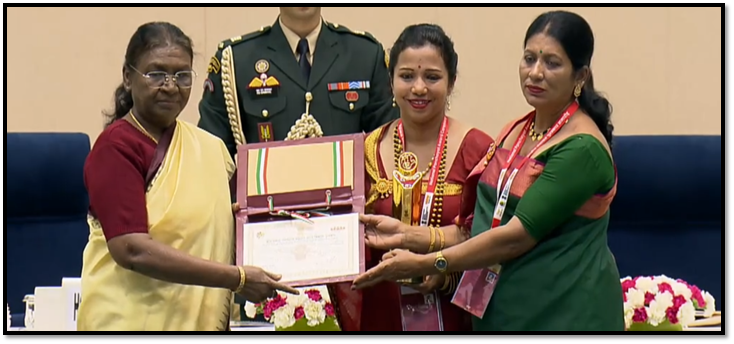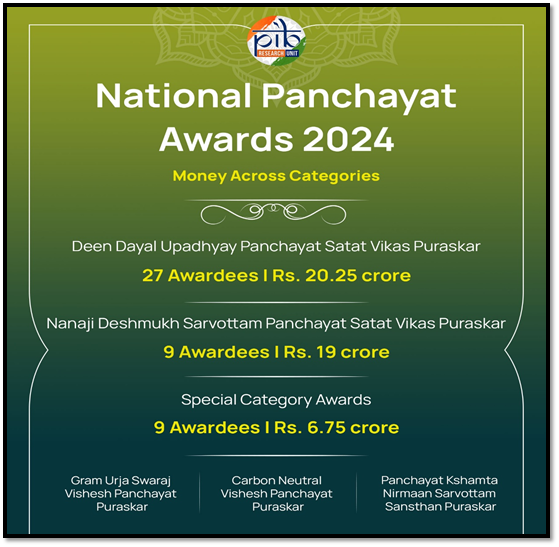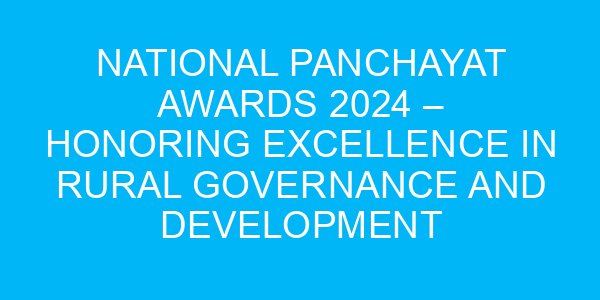The National Panchayat Awards 2024 were held on December 11, 2024, at Vigyan Bhawan, New Delhi, with Hon’ble President of India, Smt. Droupadi Murmu, presiding over the ceremony. These prestigious awards recognized 45 exceptional Panchayats for their remarkable contributions to sustainable development and inclusive governance in rural India. As competitive exam aspirants, understanding the significance of these awards and the government’s emphasis on local self-governance and sustainable development goals (SDGs) can provide valuable insights into rural development and governance for both national and state-level exams.
Key Highlights of the National Panchayat Awards 2024
Awards Ceremony Details
- Date: December 11, 2024
- Location: Vigyan Bhawan, New Delhi
- Presided by: Hon’ble President of India, Smt. Droupadi Murmu
- In Attendance: Hon’ble Union Minister of Panchayati Raj, Shri Rajiv Ranjan Singh (Lalan Singh)
The event celebrated 45 Panchayats for their outstanding contributions in various areas like poverty alleviation, water conservation, sanitation, and climate sustainability, highlighting the pivotal role Panchayats play in driving grassroots development.
Revamping of the Awards

In 2022, the awards were revamped to align with the United Nations Sustainable Development Goals (SDGs). This overhaul introduced a multi-level evaluation structure, ranking Panchayats at Block, District, State/UT, and National levels based on their performance across nine thematic areas. These areas include Poverty-Free Livelihoods, Clean and Green Panchayats, Healthy Panchayat, and Water-Sufficient Panchayat, among others.
Categories of the National Panchayat Awards 2024
The National Panchayat Awards are awarded under various categories, each recognizing unique achievements in governance and sustainable development at the grassroots level:
- Deen Dayal Upadhyay Panchayat Satat Vikas Puraskar (DDUPSVP): This award honors the top Gram Panchayats (GPs) excelling in each of the nine thematic SDG areas.
- Nanaji Deshmukh Sarvottam Panchayat Satat Vikas Puraskar: Awarded to the top-performing Gram Panchayats, Block Panchayats (BPs), and District Panchayats (DPs) across all SDG themes.
- Gram Urja Swaraj Vishesh Panchayat Puraskar: Recognizes the top GPs for adopting and promoting renewable energy sources.
- Carbon Neutral Vishesh Panchayat Puraskar: Given to Panchayats that have achieved net-zero carbon emissions, promoting climate sustainability.
- Panchayat Kshamta Nirmaan Sarvottam Sansthan Puraskar: Awards institutions providing exemplary support to Panchayats in achieving the Localization of SDGs.
These awards aim to motivate Panchayati Raj Institutions (PRIs) to implement best practices, ensuring sustainable and inclusive rural development.
Process of Selection and Evaluation
The selection process for the National Panchayat Awards 2024 was transparent and inclusive, with Panchayats evaluated at multiple levels—Block, District, State/UT, and National. The evaluation criteria were based on detailed questionnaires covering the nine SDG-related themes, ensuring a comprehensive assessment. 45 crore rupees in prize money were directly transferred to the winning Panchayats, reflecting the importance of incentivizing excellence in local governance.

Key Achievements of Awardees in 2024
The awards acknowledged outstanding contributions in various fields, with Tripura and Odisha receiving the highest recognition:
- Carbon Neutral Vishesh Panchayat Puraskar: Awarded to Panchayats from Maharashtra, Odisha, and Uttar Pradesh for their efforts in achieving net-zero carbon emissions.
- Gram Urja Swaraj Vishesh Panchayat Puraskar: Recognized Maharashtra, Odisha, and Tripura for their work in renewable energy adoption.
- Deen Dayal Upadhyay Panchayat Satat Vikas Puraskar (DDUPSVP): 27 Gram Panchayats from states like Andhra Pradesh, Bihar, Gujarat, and Kerala were honored for their significant contributions to poverty alleviation, health, education, and infrastructure.
- Panchayat Kshamta Nirmaan Sarvottam Sansthan Puraskar: Institutions from Kerala, Maharashtra, and Odisha were recognized for their exceptional support to Panchayats in achieving the Localization of SDGs.
These achievements underscore the transformative role of Panchayats in fostering resilient rural communities and contributing to India’s sustainable development goals.
Key Features and Structure of the Awards
- Multi-level Evaluation: Panchayats are evaluated at the Block, District, State/UT, and National levels to ensure comprehensive assessment across all stages of local governance.
- Transparent and Inclusive: The awards focus on nine SDG themes, recognizing Panchayats’ efforts in areas like poverty eradication, clean water, green infrastructure, and good governance.
- Incentivizing Best Practices: By recognizing top-performing Panchayats, the awards motivate others to adopt best practices in governance, fostering a spirit of competition and collaboration.
Conclusion: The Role of Panchayats in Rural Development
The National Panchayat Awards 2024 highlight the critical role of Panchayati Raj Institutions (PRIs) in driving rural development. These awards serve as a platform for celebrating grassroots governance, inclusive growth, and sustainable development. By recognizing the achievements of Panchayats, the government is fostering an environment that motivates local leaders to actively contribute to sustainable development while advancing the Localization of SDGs.
Key Takeaways for Competitive Exam Aspirants
- Government and Rural Development: The National Panchayat Awards exemplify the government’s focus on empowering local governance and advancing sustainable rural development. This is important for exams related to governance, rural development, and public administration.
- Localization of SDGs: The emphasis on SDGs and the Localization of SDGs (LSDGs) is crucial for exams on environmental policy, sustainable development, and international relations.
- Women in Governance: The fact that 42% of award-winning Panchayats were led by women is a key point for gender studies and social inclusion topics in exams.
Understanding these awards will help aspirants gain insights into how local governance functions and its importance in achieving national and international development goals, providing a strong foundation for competitive exam preparation.



